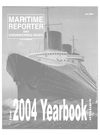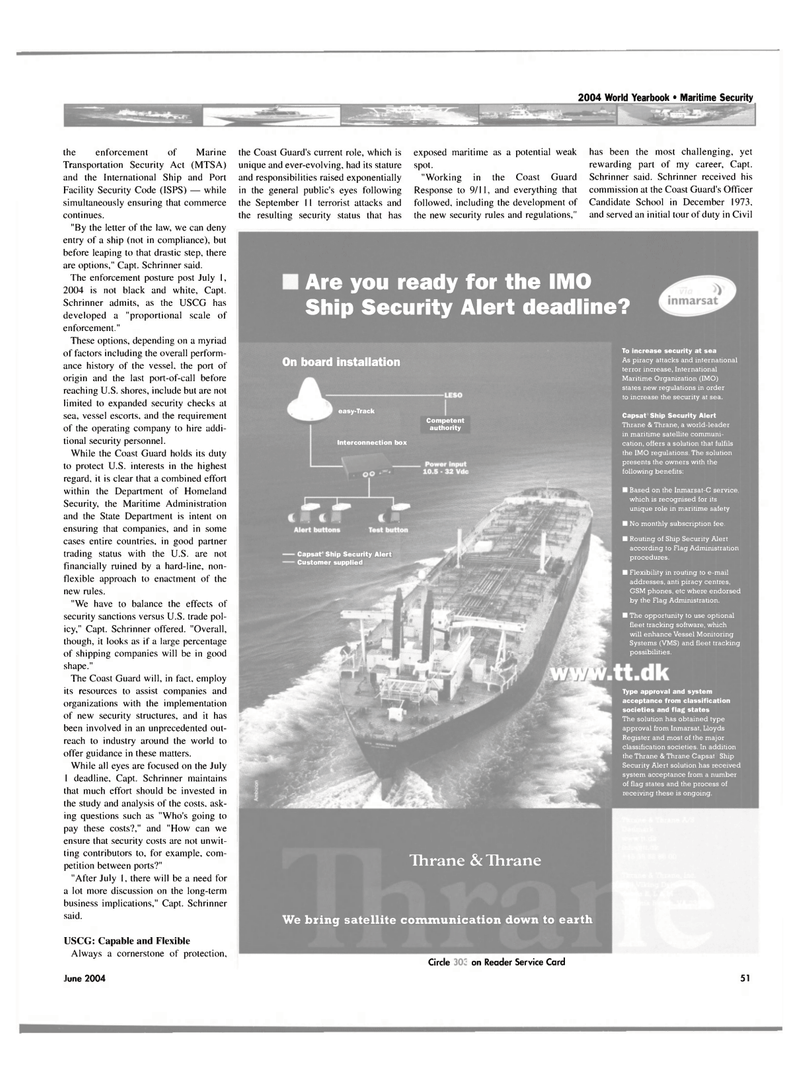
Page 51: of Maritime Reporter Magazine (June 2004)
Annual World Yearbook
Read this page in Pdf, Flash or Html5 edition of June 2004 Maritime Reporter Magazine
2004 World Yearbook • Maritime Security the enforcement of Marine
Transportation Security Act (MTSA) and the International Ship and Port
Facility Security Code (ISPS) — while simultaneously ensuring that commerce continues. "By the letter of the law, we can deny entry of a ship (not in compliance), but before leaping to that drastic step, there are options," Capt. Schrinner said.
The enforcement posture post July 1, 2004 is not black and white, Capt.
Schrinner admits, as the USCG has developed a "proportional scale of enforcement."
These options, depending on a myriad of factors including the overall perform- ance history of the vessel, the port of origin and the last port-of-call before reaching U.S. shores, include but are not limited to expanded security checks at sea, vessel escorts, and the requirement of the operating company to hire addi- tional security personnel.
While the Coast Guard holds its duty to protect U.S. interests in the highest regard, it is clear that a combined effort within the Department of Homeland
Security, the Maritime Administration and the State Department is intent on ensuring that companies, and in some cases entire countries, in good partner trading status with the U.S. are not financially ruined by a hard-line, non- flexible approach to enactment of the new rules. "We have to balance the effects of security sanctions versus U.S. trade pol- icy," Capt. Schrinner offered. "Overall, though, it looks as if a large percentage of shipping companies will be in good shape."
The Coast Guard will, in fact, employ its resources to assist companies and organizations with the implementation of new security structures, and it has been involved in an unprecedented out- reach to industry around the world to offer guidance in these matters.
While all eyes are focused on the July 1 deadline, Capt. Schrinner maintains that much effort should be invested in the study and analysis of the costs, ask- ing questions such as "Who's going to pay these costs?," and "How can we ensure that security costs are not unwit- ting contributors to, for example, com- petition between ports?" "After July 1, there will be a need for a lot more discussion on the long-term business implications," Capt. Schrinner said.
USCG: Capable and Flexible
Always a cornerstone of protection. the Coast Guard's current role, which is unique and ever-evolving, had its stature and responsibilities raised exponentially in the general public's eyes following the September 11 terrorist attacks and the resulting security status that has exposed maritime as a potential weak spot. "Working in the Coast Guard
Response to 9/11, and everything that followed, including the development of the new security rules and regulations," has been the most challenging, yet rewarding part of my career, Capt.
Schrinner said. Schrinner received his commission at the Coast Guard's Officer
Candidate School in December 1973. and served an initial tour of duty in Civil
Are you ready for the IMO
Ship Security Alert deadline?
Thrane & Thrane
We bring satellite communication down to earth
Circle 257 on Reader Service Card
To increase security at sea
As piracy attacks and international terror increase, International
Maritime Organization (IMO) states new regulations in order to increase the security at sea.
On board installation easy-Track Capsat Ship Security Alert
Thrane & Thrane, a world-leader in maritime satellite communi- cation, offers a solution that fulfils the IMO regulations. The solution presents the owners with the following benefits:
Competent authority
Interconnection box • Based on the Inmarsat-C service, which is recognised for its unique role in maritime safety • No monthly subscription fee. • Routing of Ship Security Alert according to Flag Administration procedures. Capsat^ Ship Security Alert Customer supplied • Flexibility in routing to e-mail addresses, anti piracy centres,
GSM phones, etc where endorsed by the Flag Administration. • The opportunity to use optional fleet tracking software, which will enhance Vessel Monitoring
Systems (VMS) and fleet tracking possibilities.
Type approval and system acceptance from classification societies and flag states
The solution has obtained type approval from Inmarsat, Lloyds
Register and most of the major classification societies. In addition the Thrane & Thrane Capsat Ship
Security Alert solution has received system acceptance from a number of flag states and the process of receiving these is ongoing.
June 2004 51

 50
50

 52
52
